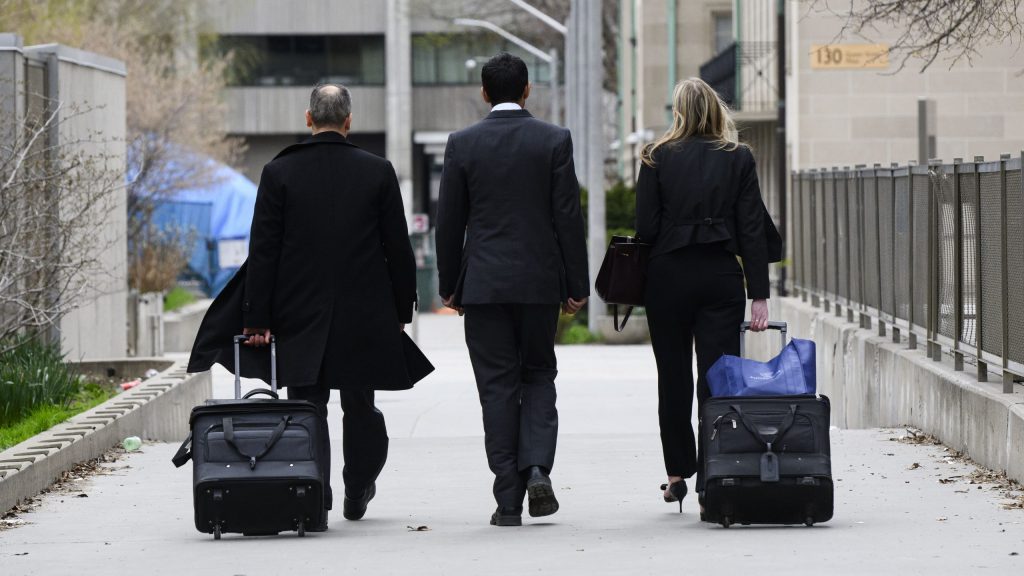Hamilton man’s fight for maternity care for wife exposes gap in Canadian system
Posted February 16, 2013 7:48 am.
This article is more than 5 years old.
An Ontario man is fighting to change what he calls a pregnancy gap in Canada’s immigration system.
Carey McGregor met his wife in Taiwan in 2005, and married in Canada two years later.
His wife Sylvia — who is Taiwanese, and not a Canadian citizen — had their first child abroad, and last year McGregor moved his family back to Canada.
Now expecting their second child and living in Hamilton, they’re grappling with a big problem.
Sylvia has what doctors call a “high-risk” pregnancy, meaning she likely needs a cesarean section to give birth.
She applied for a permanent resident visa in September, and doesn’t qualify for government medicare. Private health insurance doesn’t cover pregnancies.
Medical bills could range from $10,000 to $20,000 or higher, depending on complications.
“We are in the gap in the system,” said McGregor. “There are no options for us.”
A doctor in Hamilton recently offered to provide medical care for the birth, free of charge, until Sylvia qualifies for the Ontario Health Insurance Plan.
“But not everyone has a doctor who is willing to work for free,” McGregor said.
McGregor wants the system changed so others don’t have to face the same pressures.
“There’s a lot of people who travel and there’s a lot of Canadian men who are in Japan, Korea, Taiwan, Brazil, all over the world teaching,” McGregor said.
“They stay there for a few years, they get married, they want to move back home — and then this is what’s in place,” he said.
“It really needs to be fixed.”
McGregor’s plea, however, is getting little sympathy from government.
An official in Immigration Minister Jason Kenney’s office suggested McGregor’s wife could return to Taiwan for the baby’s birth, insisting there’s nothing preventing her from later returning to Canada.
But McGregor worries that his wife would be refused re-entry, leaving him alone with two children who have Canadian citizenship through their father.
Under federal rules, Sylvia isn’t guaranteed permission to return to Canada, says one expert.
“While a (permanent resident visa) application is in process, the sponsored spouse must stay in status and reside with the sponsor in Canada,” Vancouver-based immigration lawyer Ryan Rosenberg says in a general blog about the rules.
“As such, trips outside of Canada during processing are not usually advised.
“If an applicant leaves the country, even for a short vacation, and is not granted re-entry, that may effectively end cohabitation between the spouses and will terminate status in Canada.
“Since they now fall outside the basic requirements, the application may be refused.”
McGregor is also concerned about forfeiting the $550 fee paid to apply for a permanent resident visa.
McGregor’s member of Parliament, Stoney Creek New Democrat Wayne Marston, offers a sympathetic ear, blaming Conservative cuts to Service Canada funding for slowing down the resident visa application process.
Marston suggested the case should be expedited under the circumstances.
Citizenship and Immigration acknowledges it has a backlog of cases, but offered little hope of speeding up the process.
“We make every effort to deal with the applications we receive in the most efficient and effective way,” Kenney’s office wrote in a letter to McGregor.
“However, the many steps involved in processing an application, coupled with the volume of applications, sometimes make it difficult to conclude cases in as timely a manner as we would like.”
The federal government doesn’t keep track of the number of foreign nationals who become pregnant while they are in the process of applying for landed immigrant status. But judging by online forums where people talk about the issue, many others have dealt with a similar dilemma.
Some complain that, under a normal pregnancy, hospital stays and birthing procedures can add up to $7,000 or more. Others suggest taking an alternative, less expensive route — using a midwife rather than going to hospital.
Midwife services in Ontario are free to residents of the province, even those without permanent resident status, says the Association of Ontario Midwives.
But even then, if there are complications as with the McGregor case, the pregnant mother would be referred to emergency services, said the association.
Certain tests, including ultrasounds, would also be an out-of-pocket expense.
It can take anywhere from nine to 29 months to process a permanent resident visa application for a family member, depending on where that person was living before entering Canada, according to the immigration department’s website.
An appeal in writing by McGregor to Prime Minister Stephen Harper elicited the advice that he should contact the Ontario government, which has already told him they can’t help until his wife is a permanent resident.
Steve Lance of Kingston, Ont., moved back to Canada with his wife Hsiao-Ying, 34, also from Taiwan, and their daughter Cindy, 3, in May last year.
They want to have another child soon, but are waiting because they know Hsia-Ying doesn’t qualify for medicare, said Lance, who is 37.
“Our prime baby time would be now,” said Lance.
“We would love to go ahead with our baby plans, but the (permanent resident) process is so long … that’s just not possible.”
Both McGregor and Lance are appealing for more flexibility within the immigration system, to expedite the process for couples with at least one Canadian child.
Another alternative would be to have grandparents or other first-generation Canadians co-sign as guarantors of health-care expenses to ensure their child’s emigrating spouse is covered by medicare, Lance suggested as a possible change in Canadian policy.
“If the parent is willing to sign a piece of paper … like they do at the bank, then you can have the benefits right away,” said Lance.
“That’s what they do in Taiwan, that’s what they do in lots of other countries. I don’t understand why Canada is so backward.”










